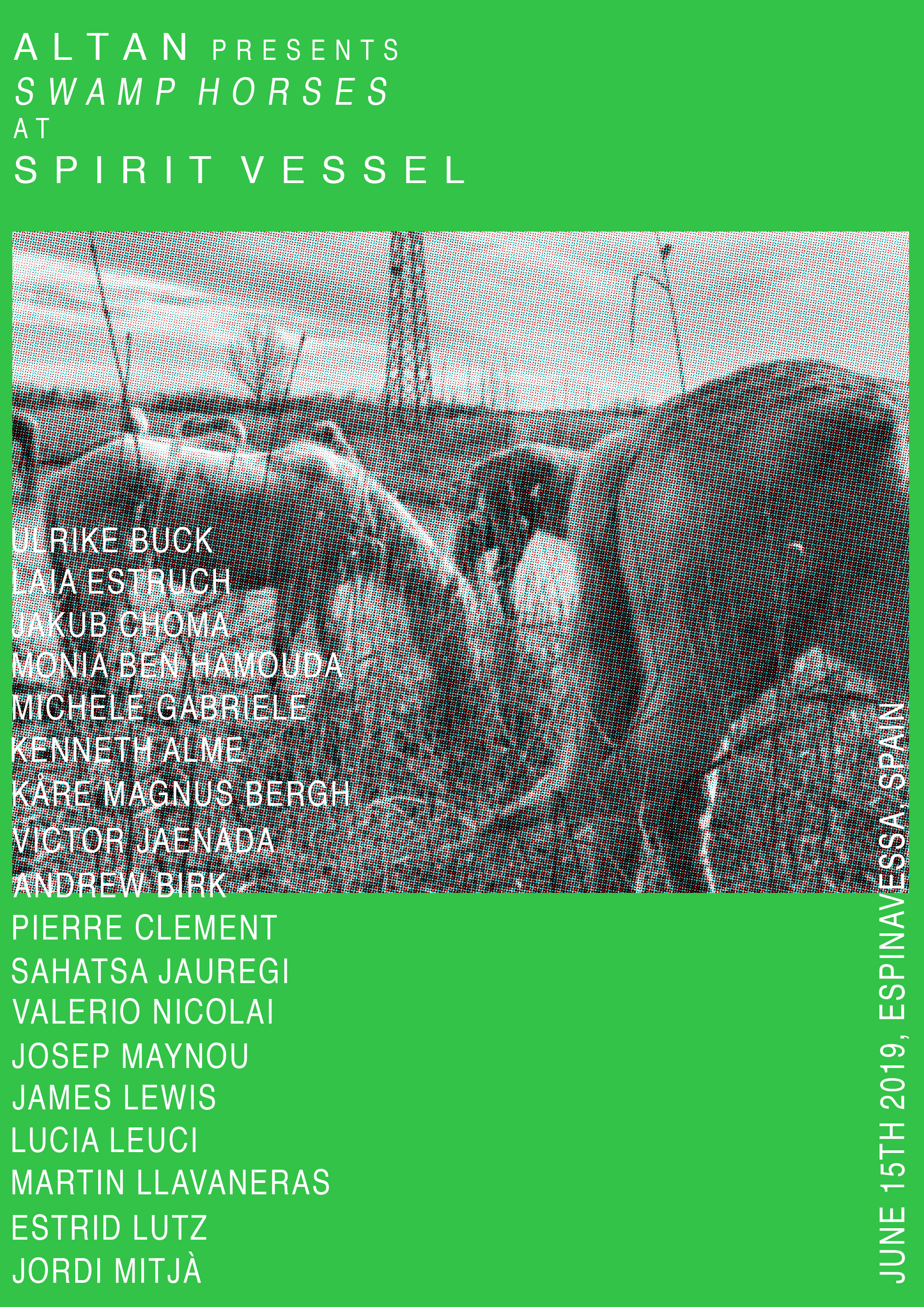![]()
Swamp Horses
Ulrike Buck, Laia Estruch, Jakub Choma, Monia Ben Hamouda, Michele Gabriele, Kenneth Alme, Kåre Magnus Bergh, Victor Jaenada, Andrew Birk, Pierre Clement, Sahatsa Jauregi, Valerio Nicolai, Josep Maynou, James Lewis, Lucia Leuci, Martin Llavaneras, Estrid Lutz, Jordi Mitjà
Curated by Andrew Birk and
Sira Pizà in collaboration with Altan
On view: June 15 – August 15, 2019
Venue: C/Font, 7 Espinavessa Girona, Spain
In January and February on hilltops, in blastocysts of stone houses with low ceilings slung together, people clump around greasy wood ovens for warmth, animals huddling underneath.
Wintry air marches down the Pyrenees head first into pijo Cadaqués, plate-glass shattering everything into cyan shards, metal signs ripped off their moors, hats flying, dunes eat into jabalí trails in the beachgrass.
Coming in like a distant highway, on the tinny pang of church-bells, expanding into all of space, enveloping, rending ancient structures willy-nilly, disheveled.
Barn doors blast open and slap flush against wood frames, glass weather-seals chattering, things peel.
Sagebrush haired sweatshirt-wearers squint forever, madly sweeping to fight the sand back and cigarette butts and beer cans and crumpled dusty Kinder wrappers that fly in from the fields and collect in the armpits of one-way streets.
Acrid shit-slurry spread shallowly over fallow surfaces, peanut-buttery reek, a grainy, all-consuming temporary phthisis, overwhelming the entryways of old farmer’s houses, prune-faced poker-players with dead noses.
A plume of pigeons rises from an old terra cotta rooftop, does one half of a half turn, a contrail line disseminating into blue vastness.
In the lust- flood of springtime, almond trees lift their skirts, tendrils unfurl and birds gawk in the marshes.
On longer days, oversized lemons and lode tomatoes sag off the vine, fat figs drip purple vinegar, punch drunk wasps and butterflies tumble through sunflowers.
An albino deer agape in the far distance, a permacast tractor path.
One work boot impaled musty and upside-down on a wooden stake, waiting.
Evening yellow lingers like perfume in an elevator, too long, painterly, perfect.
Under its spell, stone walls and thousand year doors exfoliate.
Shotgun shells scattered and rustling over the broken marble pathway glinting off towards the downing sun.
Butter white swamp horses chortle to themselves quietly in the muck in the shadow of power lines crossing the wilderness, the moon thick in the clouds.
We came here to imagine kids building forts in the floodplain detritus.
To observe leaves fall from trees, expressionist lichen, a blurry black bodied crow streaks across the plane, time unravels in front of our panting summer faces and wild windy squinting eyes.
A time-lapse of matter building up and frothing forth, swelling in assertive dominion, then weathered, receding, bowing justly and blowing away; moment after moment and year after year.
– Andrew Birk, 2019
An old home in the countryside that has hosted multiple life cycles: its foundations were already built with the ruins of older buildings, and it has changed in shape, size and function over centuries. Now a fragmented structure, layers pile up, revealing different time periods and domestic histories in one small archeological mess.
Located right next to the village’s church and cemetery, Spirit Vessel is the manifestation of a new life project that begins to fill this structure as a home and workspace. As in all rural areas, once hubs of activity when agriculture was the base and sustenance of life, they went from existing in the time of all-consuming labor, self-sufficiency, and a lifetime dedicated to its own local biological permanence; to the time of production at the beginning of worldwide integrated systems. A return to these empty spaces is taking place, re-appropriating and re-distributing meaning to the context, now from the perspective of a digitalized and globalized generation.
Spirit Vessel is hosting a group of works that celebrate this opening statement with their own approaches on our notions of ourselves in relation to our environmental time. In these works, the time of one human cycle as a measure of nature and historicity clashes with the chronology of the organic and the imprint of mankind’s manipulation of its habitat. Fossils of how we imagine the past to be appear as more accurate to our projection of the world in fictional narratives adjusted to our imagination, than the relevance of truth. Artists play with the mystification and personification of nature in a ritualistic relation with its elements and cycles, they recreate structures, grids and biological architecture, or the erosion and disintegration of materials in a new symbiosis of the organic and the technological over a scenario of an already fully blown ecological collapse. They go back and forth between traditional craftsmanship and processes, and accelerated image circulation. Wild horses in a swamp, oblivious to the violent winds and cohabiting with distant electric lines, provide an idyllic backdrop for this projection of our futures in the new meaning of landscape.
– Sira Pizà, 2019
![]()
![]()
![]()
![]()
![]()
![]()
![]()
![]()
![]()
![]()

